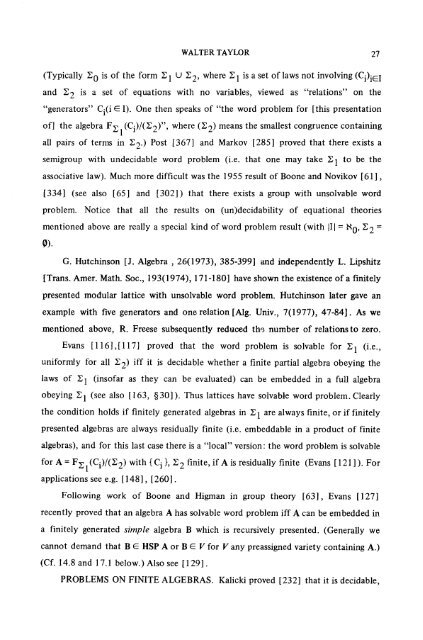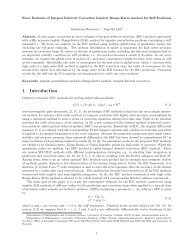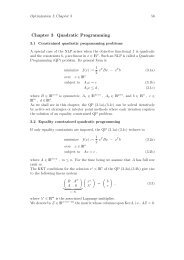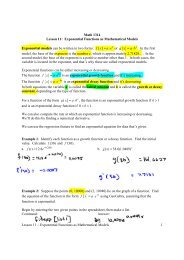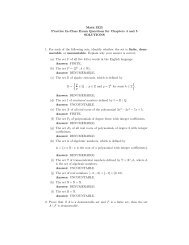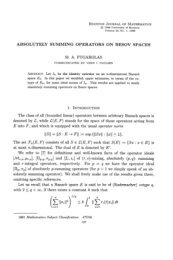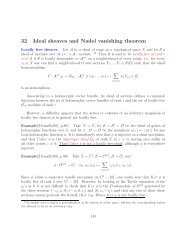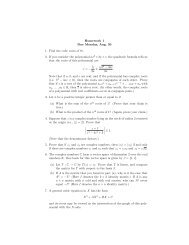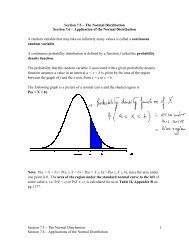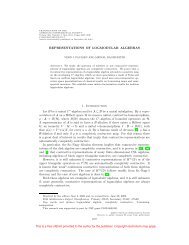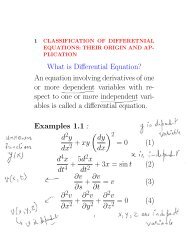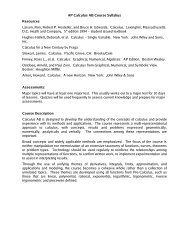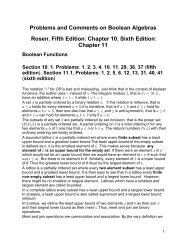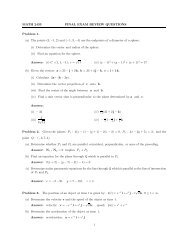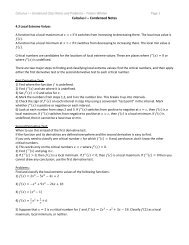Survey 1979: Equational Logic - Department of Mathematics ...
Survey 1979: Equational Logic - Department of Mathematics ...
Survey 1979: Equational Logic - Department of Mathematics ...
You also want an ePaper? Increase the reach of your titles
YUMPU automatically turns print PDFs into web optimized ePapers that Google loves.
WALTER TAYLOR 27<br />
(Typically 0 is <strong>of</strong> the form E 1 U 2, where 1 is a set <strong>of</strong> laws not involving (Ci)iC I<br />
and 2 is a set <strong>of</strong> equations with no variables, viewed as "relations" on the<br />
"generators" Ci(i C I). One then speaks <strong>of</strong> "the word problem for [this presentation<br />
<strong>of</strong>] the algebra FEi(Ci)/(22)", where (2) means the smallest congruence containing<br />
all pairs <strong>of</strong> terms in E2.) Post [367] and Markov [285] proved that there exists a<br />
semigroup with undecidable word problem (i.e. that one may take E 1 to be the<br />
associative law). Much more difficult was the 1955 result <strong>of</strong> Boone and Novikov [61],<br />
[334] (see also [65] and [302]) that there exists a group with unsolvable word<br />
problem. Notice that all the results on (un)decidability <strong>of</strong> equational theories<br />
mentioned above are really a special kind <strong>of</strong> word problem result (with III= 0' 2 =<br />
G. Hutchinson [J. Algebra , 26(1973), 385-399] and independently L. Lipshitz<br />
[Trans. Amer. Math. Soc., 193(1974), 171-180] have shown the existence <strong>of</strong> a finitely<br />
presented modular lattice with unsolvable word problem. Hutchinson later gave an<br />
example with five generators and one relation [Alg. Univ., 7(1977), 47-84]. As we<br />
mentioned above, R. Freese subsequently reduced th, number <strong>of</strong> relations to zero.<br />
Evans [116],[117] proved that the word problem is solvable for E 1 (i.e.,<br />
uniformly for all E 2) iff it is decidable whether a finite partial algebra obeying the<br />
laws <strong>of</strong> E 1 (ins<strong>of</strong>ar as they can be evaluated) can be embedded in a full algebra<br />
obeying<br />
1 (see also [ 163, õ30]). Thus lattices have solvable word problem. Clearly<br />
the condition holds if finitely generated algebras in ! are always finite, or if finitely<br />
presented algebras are always residually finite (i.e. embeddable in a product <strong>of</strong> finite<br />
algebras), and for this last case there is a "local" version: the word problem is solvable<br />
for A = Fi (Ci)/( 2) with {C i , 2 finite, if A is residually finite (Evans [ 121 ] ). For<br />
applications see e.g. [ 148], [260].<br />
Following work <strong>of</strong> Boone and Higman in group theory [63], Evans [127]<br />
recently proved that an algebra A has solvable word problem iff A can be embedded in<br />
a finitely generated simple algebra B which is recursively presented. (Generally we<br />
cannot demand that B HSP A or B V for V any preassigned variety containing A.)<br />
(Cf. 14.8 and 17.1 below.) Also see [129].<br />
PROBLEMS ON FINITE ALGEBRAS. Kalicki proved [232] that it is decidable,


